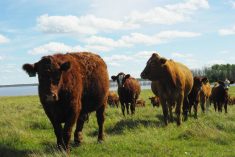It could be weeks before Saskatchewan and Manitoba cattle producers who use federal pastures know which five will transfer to each province next year.
Those affected won’t have much time to make alternative grazing arrangements for 2013, acknowledged the federal bureaucrat in charge of the divestiture.
“Time is getting short in terms of identifying pastures,” Alan Parkinson said.
“Producers are probably going to get jammed because it’s quite likely we’re not going to be able to tell producers their pasture is closing till late July, early August.”
Read Also

Farming Smarter receives financial boost from Alberta government for potato research
Farming Smarter near Lethbridge got a boost to its research equipment, thanks to the Alberta government’s increase in funding for research associations.
A producer at Parkinson’s presentation said he couldn’t plan to buy a chute or ear tags when he didn’t know if he’d be able to keep his cattle.
He asked if Ottawa had “any appreciation for how bad you’ve screwed the cattle industry in this province.”
The federal government announced in April it would gradually transfer management of its 85 pastures to the provinces. Sixty of them are in Saskatchewan.
Five in Saskatchewan and five in Manitoba are to be transferred next year.
The June 15 deadline to identify the first 10 came and went without an announcement.
Parkinson said June 22 that he thought the governments were close to agreement, but there was still no word by July 6.
An e-mail from Agriculture Canada said only that discussions were ongoing.
Saskatchewan has thrown a wrinkle into the process by forming an advisory committee to help the agriculture minister decide what to do with the pastures after they are transferred, Parkinson said.
The province wants to sell the pastures but hasn’t yet determined to whom and for how much. It already operates 52 pastures of its own.
In Manitoba, where 24 pastures are affected, Manitoba Beef Producers and the chairs of pasture patron advisory committees have formed a steering committee to come up with a plan to keep the land available for grazing.
The government has said it isn’t interested in operating a pasture program.
MBP has suggested a producer association to manage all the pastures. It also wants patrons to have first right of refusal on the land if it is sold.
Parkinson said that would be up to the provinces.
He also said the average pasture would be worth $12 to $15 million if kept in agricultural use. Oil and gas holdings on the land would increase the value.
Although many of the questions asked during a Regina seminar at Canada’s Farm Progress Show held last month would have been better put to the province, Parkinson said all feedback would be shared.
“We’re asking them, as they think about the next step in terms of what they’re going to do with the land after the pastures are divested to them, that they start to (deal with) some of these concerns,” he said.
Parkinson also said the approximately 3,000 bulls in the pasture program would be maintained for now and that issues such as invasive weeds would be dealt with as long as the federal government administers the land.

















